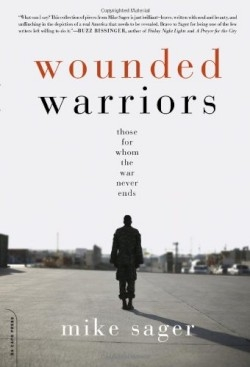Wounded Warriors
Those for Whom the War Never Ends
It doesn’t matter—Iraq War, drug war, culture war, gang war, race war, or Vietnam War—where there’s war there are both the wounded and the survivors who get to fight another day. Sager exhumes real people behind potent stereotypes, hopping from a Marine barracks for a regiment of wounded warriors to an island paradise owned by Marlon Brando to the filthy dog fighting pits of North Philadelphia to drug dens to high IQ societies to yoga sessions for the NAAFA (National Association to Advance Fat Acceptance). Says Sager after a fruitless pursuit of infamously reporter-adverse Marlon Brando: “I’m a journalist. I take scrapings of their insides, samples of their deepest thoughts and feelings, and then I display it for everyone to see.” And he usually does get his story. In this latest of three essay collections Sager, a regular contributor to Esquire, Rolling Stone, and GQ, dissects his subjects with surgical skill, serving up juicy splices of lives lived in the trenches.
In the most compelling chapter, Sager hangs with a group of wounded Iraq War Marines whose mission has changed because of the seriousness of their injuries. Each might have been a candidate for a discharge before Lieutenant Colonel Tim Maxwell, also profoundly wounded during his sixth deployment, convinced the Corps to keep them on and to help them recover to possibly become active fighters again. Each soldier speaks for himself and Sager is brilliant at getting folks to talk. Their reasons for being in the battle, their injuries, and their present circumstances are gripping. Maxwell, who suffered a traumatic head and brain injury, describes his efforts to help returning casualties: “[Y]oung Marines, they have a lot of mixed feelings when they get back. I use my story…I tell them about good luck and bad luck.”
But Sager’s point is that many situations breed casualties. He dives into a Los Angeles Chicano gang, their power both made by selling crack and unmade by the members’ addiction to it. He rides along with Charlie, a smart and thoughtful man encased in hundreds of pounds of fat, who can’t walk down the street without sneers and comments from passersby. He visits Vietnam vets living in the Thailand who stay for the old feelings of war’s excitement or to stretch their pensions.
Sager looks into the lives of some of society’s walking wounded and sees their humanity, their accomplishments, and their everyday battle to survive.
Disclosure: This article is not an endorsement, but a review. The publisher of this book provided free copies of the book to have their book reviewed by a professional reviewer. No fee was paid by the publisher for this review. Foreword Reviews only recommends books that we love. Foreword Magazine, Inc. is disclosing this in accordance with the Federal Trade Commission’s 16 CFR, Part 255.

